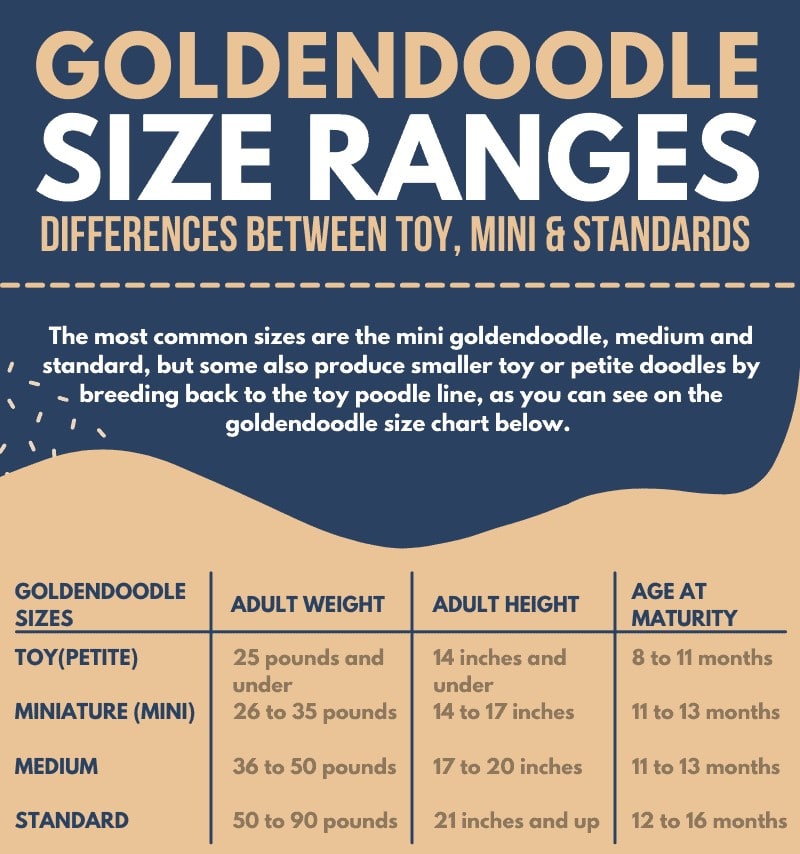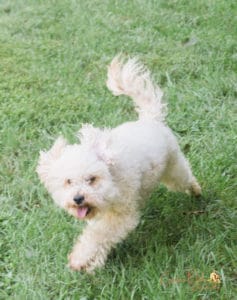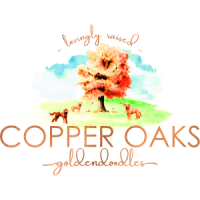The Godlendoodle Breed
One word describes the typical Goldendoodle personality: friendly! Goldendoodles are known for being happy, outgoing, and people-pleasing. Of course, dogs’ personalities vary a lot depending on genes and how much socialization they get. But in general, Goldendoodles get along with everybody, making them one of the most popular breeds in the country.
They are a relatively new dog breed, first appearing in America in the 1990s. Their adorable name was coined in 1992. While not officially a registered breed of their own, Goldendoodles are considered a “designer breed” because each of their parents is a purebred, but different breeds from each other. Poodles don’t shed and are very athletic and intelligent, while Golden Retrievers are lovable and playful family dogs. The mix makes the Goldendoodle a great choice for a lifelong pal, especially for those with mild pet allergies, though no dog is completely hypoallergenic.
Goldendoodles are extremely social, outgoing, non-aggressive dogs that thrive on human companionship. They have a great desire to please and to learn. Each individual breed (the Poodle and the Golden Retriever) score in the top 4 of the 150 smartest dog breeds. Being incredibly intelligent and eager to please, coupled with the low to non-shedding coats, this temperament has proven to make the Goldendoodle ideal for service work as well as family pets.
Goldendoodle Varieties
There are many combinations of the Doodle x Retriever hybrid generations, including size, coat, color and breed ratio.
Generations & Size
Goldendoodles come in Toy, Mini, Medium and Standard sizes as shown on the Size Range chart. The mix of Golden Retriever and Poodle generations are typically seen in the combinations below. Generally, a Doodle breed with more Poodle genes will likely shed less, have a curlier coat, and has a hypoallergenic characteristic. If the Golden Retriever’s gene is more dominant, then the Goldendoodle will likely turn out to have a less curly coat (wavy coat or straight coat).
F1 = Golden Retriever x Poodle
F1B = F1 Goldendoodle x Poodle
F1BB = F1B Goldendoodle x Poodle
F2 = F1 Goldendoodle x F1 Goldendoodle
Multigen = Two Goldendoodle parents – One parent has to be an F1B or multigen. A Poodle or a Golden Retriever bred to a multigen Goldendoodle also constitutes a multigen.

Color, Coat & Pattern
Color – Goldendoodles come in a considerable variety of colors. The Poodle and Golden Retriever share cream, apricot and red, while the Poodle also introduces the possibility of chocolate (dark brown), silver and gray coloring to the breed.
- As your Goldendoodle starts to develop its adult coat, you will also notice that certain parts of its coat will hold more color. Their coat will lighten as it starts to develop an adult coat, while holding their puppy colors around their ears and muzzle.
Coat – The 3 contributing genes to a Goldendoodle’s coat type are: Coat Curl, Coat Length, and Furnishings.
- Goldendoodles can have straight, wavy or curly hair depending on what type of curl gene they inherit from each parent.
- Since Poodles and Goldens both carry long hair genes, all Goldendoodles have longer coats.
- The term “Furnishings” refers to the longer hair on the face which give the Goldendoodle that Teddy Bear look.
Pattern – There are parti, merle, phantom, and brindle patterns possible for any color.
- A parti colored Goldendoodle is at least 50% white, with solid patches of any other color. A solid color Goldendoodle with white markings that cover less than 50% is also common, but not officially “parti”.
- Merle is a varied coat pattern.
- Brindle patterns appear as stripes.

Personality
Most goldendoodles are known to become fast friends with children, cats, and other dog breeds, making them an ideal dog for a family pet. Energetic and playful, Goldendoodles love to exercise. They’re happy to laze around on the sofa (and they make great cuddle buddies), but agility is where they shine. These dogs are great companions for active families.
The Poodle’s intelligence and Golden Retriever’s obedience makes this breed wonderful service animals. They are a good choice if you’re in need of a guide dog or therapy dog or a companion pet for hospital patients or people in nursing homes. For anyone needing a little cheering up, their happy demeanor will bring an instant smile to anyone’s face.
Goldendoodles can be easy to train and are a good match for new dog owners. They are not known to have any aggressive traits, but they do need proper socialization to avoid any shyness or fearfulness. Goldendoodles are social and need daily contact with their owners.
Health & Environment
Health
The increased health benefits of crossing two completely unrelated breeds, gives the Goldendoodle the health and vitality that makes them, on average, outlive either one of their parent breeds. It should be stressed, however, that the general health and vitality is enhanced dramatically when parents have been genetically tested for the inherited diseases that both parent breeds share in common.
The life expectancy of a Goldendoodle will be around
- Standard Goldendoodles 11-14 years
- Medium Goldendoodles 12-15 years.
- Mini Goldendoodles 12-16 years
- Petite Mini 13-17 years
Knowing about common health issues among Golden retrievers and Poodles will help you monitor your Goldendoodle’s health throughout their life. We test by parentage to ensure against common genetic health concerns

Environment
Goldendoodles have moderate energy levels and live to be around their humans. That means that whether you live in an apartment or a house with a large yard, your goldendoodle will thrive with daily exercise alongside the people they love. In other words, they’ll need some long walks!
Their retriever in them loves a game of fetch, so a fenced yard is best, but Goldendoodles can also live in apartments as long as they have access to outdoor activities like walks, runs, or hikes.
As a social breed, they do best alongside their family and friends indoors. They need outdoor play time but shouldn’t stay outside all day. Give them a soft place to rest at home, and access to plenty of water throughout the day.
